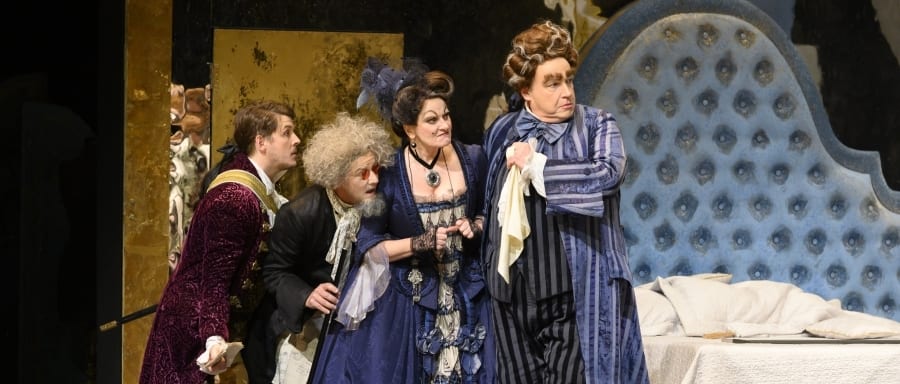Some say that Mozart’s revolutionary opera, The Marriage of Figaro, should really be called The Marriage of Susanna. Welsh National Opera’s enjoyable version of the opera certainly puts Soraya Mafi’s fine Susanna in the centre of the action but it manages to create a sense of ensemble that serves the piece well. The staging has nothing really new to say about the opera, but the story – of the Day of Madness, as the opera’s subtitle has it – comes through clearly and with charm.
The opera tells the tale of the wedding day of Figaro and Susanna, servants in the household of the lecherous Count Almaviva. Almaviva lusts after Susanna and the comedy develops around the ingenious efforts of the servant couple to thwart their master, to overcome other obstacles, and to embark on their married life unscathed. In this they are aided by the Countess who loves her husband despite everything and wishes to win him back to fidelity. The opera is based on a play by French author Beaumarchais and it was, in its original form, a scathing attack on the ancien regime. In this production the barely concealed contempt of the servants for their disreputable master echoes this theme. Though toned down by Mozart and his brilliant librettist Da Ponte, it was somewhat surprising that Mozart got permission to put on the opera in Vienna for its first performance in 1786. The genius of the opera lies in Mozart’s ability to infuse what is essentially farce – people hiding in cupboards, jumping out of windows, swapping clothes in disguises – with scenes which deal with love and loss and heartbreak set to music of sublime power and beauty.
Soraya Mafi gives us a Susanna who is absolutely the equal of her scheming fiancé Figaro. From the first scene in which she explains to her slow-on-the-uptake partner that the Count has designs upon her, she is as much the orchestrator of the action as he is. And she has a superb soprano voice, giving her marvellous Deh Vieni aria just the right flavour of erotic yearning. David Ireland is an energetic Figaro who looks as if he could easily floor the Count given just a little more provocation – he delivers his final scene aria about the treachery of women with real venom. The director sees the Countess as a rather passive victim of her unhappy marriage though her behaviour with the pageboy, Cherubino, during the wedding dance scene hints at a change in her future intentions! Anita Watson makes the most of her musical moments including a beautifully judged version of Dove Sono. Jonathan McGovern is a rather un-aristocratic Count Almaviva. He is a very fine baritone but his portrayal of the lecherous Count – all grimaces and bent knees – was not to my taste.
The minor roles were – as one expects of WNO – all exceptionally well sung. No space here to do them all justice but the wonderful Leah-Marian Jones was a brilliant Marcellina and made the most of her Act 4 aria, which directors all too often cut these days. And in the tiny role of Barbarina, Harriet Eyley made a real impression, vocally and dramatically – a future Susanna, I bet. The WNO orchestra and chorus seem to relish Mozart and were on top form, responding with verve to the welcome return of their old boss Carlo Rizzi to the conductor’s rostrum. The demands of touring opera perhaps showed in the look of the stage design. Two large rotating screens dressed with different fabric covers for each act provided a bold visual setting, though one wonders ‘why all the chairs?’ in the contract judgement scene.
This production is touring to eight more cities, including Bristol, Birmingham, and Southampton. It is full of treats, especially the fine singing of some of Mozart’s most beautiful arias. Not to be missed.

